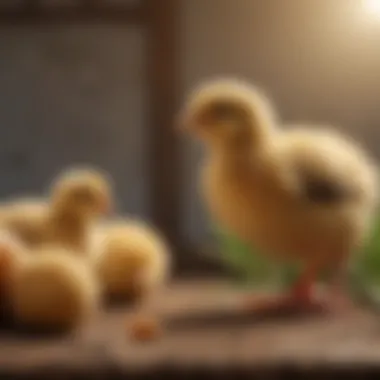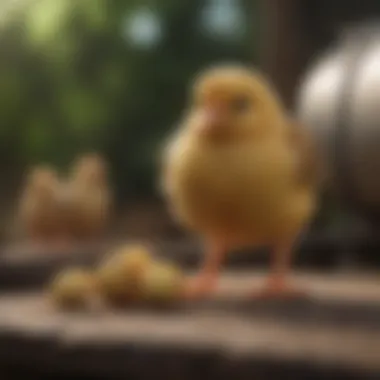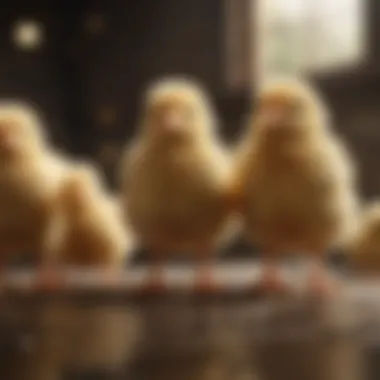Guidelines for Feeding Chicks: Starter Feed Duration


Intro
Caring for chicks is a vital and rewarding endeavor for any poultry enthusiast or pet owner. From the moment they hatch, chicks depend on proper nutrition to grow strong and healthy. One fundamental component of their early care is the duration on starter feed, which plays a key role in ensuring their development. Understanding the nutritional needs, the characteristics of starter feed, and how to transition to grower feed can be a game-changer for the well-being of your young birds.
In this article, we will dig into the intricacies of feeding chicks, detailing not just the timing and types of feed necessary for their growth but also considering factors like age, breed, and overall health status. Whether you are a seasoned poultry keeper or just stepping into the world of chick rearing, this guide aims to furnish you with knowledge that will aid in nurturing your feathery companions with care and precision.
Nutritional Rundown
When talking about feeding chicks, one must first zero in on their nutritional requirements. Chicks require a balanced diet rich in proteins, vitamins, and minerals to support their rapid growth.
- Protein: Essential for muscle development and overall health. A protein content of around 18% to 20% in starter feed is standard.
- Vitamins and Minerals: Elements like calcium and phosphorus are critical for bone development and health.
Starter feeds are specifically formulated to meet these needs, ensuring chicks receive the right nutrients right from the start. Usually, commercial starter feeds contain a mix of grains, protein meals, and essential additives to help support optimal growth and prevent health issues.
Duration on Starter Feed
The duration for which chicks should remain on starter feed typically ranges from six to eight weeks. During this phase, their bodies are rapidly developing, and they need that consistent nutrition to flourish. However, the timing may vary based on several factors:
- Age: As chicks grow, their nutritional needs shift. Hence, the transition to grower feed should be gradual and based on their age and size.
- Breed: Some breeds, like broilers, are bred for quicker weight gain and may require a slightly different feeding regimen than layers, who develop more slowly.
- Health Status: If a chick is under stress or recovering from illness, a longer duration on starter feed may be beneficial.
Transitioning to Grower Feed
Once the chicks reach around six to eight weeks, it’s time to plan the transition to grower feed. This feed generally has lower protein content compared to starter feed, usually around 15% to 18%. Here are helpful pointers for a smooth transition:
- Gradual Shift: Mix the grower feed with the starter feed for a week, slowly increasing the ratio of grower feed.
- Observe Behavior: Monitor how the chicks respond to the new feed. They should be eager and active after the switch.
- Nutritional Reassessment: Always consider individual development trends. If the chicks aren’t gaining weight appropriately, adjust the transition schedule as needed.
Keeping a close eye on your chicks during the starter phase and the transition to grower feed will pay off immensely in terms of their health and productivity.
End
Understanding how long to keep chicks on starter feed, as well as the specifics of their nutritional needs, is vital to raising healthy poultry. From choosing the right feed to recognizing when to transition, every step plays a part in their growth journey. Armed with this knowledge, you can approach chick feeding with confidence, ensuring your young flock thrives from their very first days.
Prologue to Chicks and Their Nutritional Needs
When it comes to raising chicks, understanding their nutritional needs from the get-go is crucial. Chicks, like any young living beings, require a specific set of nutrients that directly influence their growth and development. Not paying attention to these needs can lead to myriad problems in both growth rates and general health. In this section, we will delve into essential concepts regarding chick nutrition, ensuring that you are well-equipped to raise healthy and thriving chicks.
Understanding Chick Development Stages
Chicks progress through various stages of development, and each stage has its own nutritional requirements. Right after hatching, they go through a crucial period when they depend heavily on their yolk sac for nutrition. The first couple of days is like a warm-up session. After that, it’s time to introduce starter feed. Typically, these stages are broken down as follows:
- Day 1-3: Hatching and Initial Nourishment
During this early phase, chicks consume the yolk sac, which provides enough nutrients for the first few days. - Days 4-21: Starter Feed Phase
This is a significant window where high-quality starter feed is essential, as it is packed with protein, vitamins, and minerals needed for fast growth. - Weeks 3-6: Transition to Grower Feed
As chicks get older, they’ll gradually require different levels of nutrients—hence the transition to grower feed while still ensuring they have the proper balance of proteins and carbohydrates.
Understanding these stages can equip owners with the knowledge to support their chicks at each developmental phase, adjusting their feeding methods as necessary.


Importance of Nutrition in the Early Life of Chicks
Nourishment in the early days of a chick’s life can’t be stressed enough. Chicks are notoriously resilient, but without adequate nutrition, their potential is stunted. Nutrition serves several critical roles during this phase:
- Growth and Development
Proper nutrition fuels quick growth. Nutrients from starter feed contribute to strong bones, feathers, and overall body mass. In fact, a healthy chick can almost visibly grow day by day. - Immune System Strengthening
Young chicks are vulnerable to diseases. A well-balanced diet supports the immune system, making the chicks more resilient to illness and infection. - Behavioral Impacts
Underfeeding or poor-quality feed can lead not only to health issues but also to behavioral problems. It’s easy to overlook, but a well-fed chick tends to exhibit more curious and assured behavior, whereas under-nourished chicks may become lethargic or anxious.
"The first few weeks can dictate the overall well-being of your flock for months, if not years to come."
Ensuring that chicks are fed properly sets the stage for successful growth, laying the foundation for their development into healthy, productive birds. As you navigate the intricacies of raising poultry, keeping these nutrition principles in mind will be paramount.
What is Starter Feed?
When it comes to raising healthy chicks, starter feed plays a pivotal role. This specialized feed is designed to cater to the unique nutritional needs of young poultry. Unlike regular feed, starter feed contains a higher concentration of essential proteins, vitamins, and minerals, which are crucial for fostering healthy growth and development in chicks.
Starter feed typically contains around 20-24% protein, as this is essential for the rapid growth these animals experience in the first few weeks of life. This concentrated nutrient profile is not only important for muscle development but also for supporting the work of internal organs and the immune system. Given that chicks cannot consume solid feed immediately after hatching, a finely ground texture in starter feeds ensures that they can easily ingest their food without any choking hazards.
Moreover, starter feeds often include added supplements and probiotics that enhance digestive health. This can significantly reduce the occurrence of common chick ailments that stem from poor nutrition or gut health issues. Understanding the specific attributes of starter feed is essential for any poultry owner aiming for successful chick rearing.
Nutritional Composition of Starter Feed
The nutritional composition of starter feed is engineered to give chicks the best possible start. It’s typically rich in:
- Proteins: Important for building muscles and tissues. The proteins come from various sources, often including soybean meal and fish meal.
- Vitamins: These boosts overall health and aids in metabolic processes. Key vitamins include A, D, E, and several B vitamins.
- Minerals: Calcium and phosphorus are crucial during early development, aiding in skeletal structure and function.
- Energy Sources: Carbohydrates and fats provide energy, crucial for the high metabolic rate of growing chicks.
These components work together to create a balanced diet that fulfills all the dietary needs of young chicks in their critical growth phase.
Benefits of Using Starter Feed for Chicks
Utilizing starter feed comes with numerous advantages:
- Optimized Growth: The high-protein content directly correlates with better weight gain and developmment during the initial weeks.
- Improved Immunity: Kicking off with a diet fortified with vitamins and minerals strengthens the chicks’ immune response. This translates to fewer health issues.
- Enhanced Digestive Health: With probiotics included in the formulation, starter feed aids in establishing a healthy gut microbiome. A well-functioning gut is vital for nutrient absorption.
- Convenient Feeding: Starter feed can often be fed to chicks without the need for mixing or additional supplements, simplifying the feeding process.
"The right nutrition in the early days paves the way for a lifetime of health in poultry."
In summary, recognizing the critical role of starter feed not only informs effective feeding practices but also underscores the importance of ensuring that chicks get a well-rounded diet during these formative weeks.
Duration for Feeding Starter Feed
Understanding the right duration for keeping chicks on starter feed is crucial for their growth and development. The starter phase lays the groundwork for their long-term health and productivity, making the right feeding schedule a fundamental concern for any poultry keeper. A well-timed transition from starter feed can lead to healthier chicks that grow more robustly.
To maximize the benefits of starter feed, one must consider not only the nutritional composition of this feed but also the timing of its administration. The duration should match the specific needs of the chicks, which change as they grow. By maintaining awareness of various factors affecting feeding, you ensure that chicks receive the optimal nutrition while preparing them for the next stages of their lives.
Recommended Timeframe on Starter Feed


Typically, it is suggested that chicks remain on starter feed for the first six weeks of life, but this can vary based on several factors. The consensus among poultry experts is that during these initial weeks, chicks experience rapid growth requiring a rich supply of protein and nutrients. The first two to three weeks are especially critical. In these times, they are adjusting to their new environment and are mainly reliant on the feed provided. Overfeeding or underfeeding during this time can lead to complications later, so keeping a close eye on their growth and adjusting feed intake accordingly becomes important.
Moreover, the type of starter feed used can also influence the duration. Some formulations may support growth for slightly longer, allowing you to stretch the time on starter feed rather than a strict six-week window. Regular monitoring of body weight and health status can help in making the right decision.
Factors Affecting Duration on Starter Feed
Age of the Chick
The age of the chick plays a pivotal role in how long it should stay on starter feed. Younger chicks, particularly those in the first week, require higher protein levels typically found in starter feeds. At this age, their digestive systems are still maturing, and they are not as adept at processing different types of feeds. Nutritional scientists have noted that maintaining a high-protein diet is essential during these formative weeks.
As chicks grow older, they gradually become more robust and their dietary requirements shift. Around the fourth week, many start to show signs that they may be ready for a transition to grower feed. It is essential to monitor their weight gain and overall health during this process to determine if they can handle a change. The balance between age and feed duration is a delicate one, and therefore, it's wise not to cut corners too early in their development.
Breed Considerations
Different breeds of chicks can have varying needs regarding the duration on starter feed. Certain breeds, like broilers, are bred for rapid growth, while others, such as layer breeds, develop more slowly. Recognizing these traits can guide you to decide how long to keep your chicks on starter feed. For instance, those planning to raise broilers might want to keep their chicks on starter feed all the way up to six or seven weeks due to their intense growth requirements. On the other hand, layers may taper off much earlier as they prepare for a diet aimed at egg production.
Each breed has unique characteristics, and understanding them helps in optimizing feeding schedules effectively. Talking with experts or referencing breed-specific guides can be invaluable.
Health Status
The health status of the chicks cannot be overlooked when determining how long they should stay on starter feed. Chicks that are weak or sick might require a prolonged duration on starter feed to ensure they receive the vital nutrients necessary for recovery and growth. Monitoring their health involves observing their behaviors such as feeding habits, movement, and interaction with other chicks.
Healthy chicks typically reach a weight and size where transitioning to grower feed seems appropriate. If a chick is noticeably lagging behind its peers, it may be a red flag indicating that a longer duration on starter feed is necessary. In this light, understanding overall health is like a compass, pointing you in the right direction concerning diet and duration.
Nutrition in the early life of chicks is not just a checkmark on a list; it is an investment in their future productivity and well-being.
Transitioning from Starter to Grower Feed
Transitioning your chicks from starter feed to grower feed is a crucial part of their development that sometimes gets brushed aside. Many poultry owners assume that once chicks are a certain age or size, they can simply make the switch without any further thought. However, if this shift isn't handled with care, it can lead to growth issues or health concerns that are much easier to prevent than to fix. In essence, the transition marks a significant step from the needs of young chicks, which are primarily focused on rapid growth, towards a stage where they will be maintaining their strength and preparing for adult life. This phase requires its own set of nutritional considerations and understanding.
Signs That Chicks Are Ready to Transition
Recognizing when your chicks are prepared to make the leap from starter to grower can sometimes feel like trying to find a needle in a haystack. However, there are tangible indicators that can help clarify the situation. Here are some vital signs that suggest your chicks may be ready for this dietary change:
- Weight Gain: If your chicks are consistently hitting the expected weight milestones, they might be ready for grower feed.
- Feather Development: Chicks should begin to develop their adult feathering, particularly around the wings and tail. A lack of feathering can indicate they still need more protein and nutrients from starter feed.
- Behavioral Changes: Increased activity and curiosity can also signal readiness. If they’re exploring their environment and socializing more, they show signs of robust growth.
- Age: Generally, chicks should transition at about 6 to 8 weeks, depending on their breed and growth rates.
"Keeping a keen eye on the signs will ensure your chicks do not outgrow their starter diets too soon or too late, both of which could impede their growth."
Gradual Transition Strategies
Once you've identified that your chicks are ready for grower feed, it’s essential to approach the transition carefully. The idea is to shift their dietary habits without causing unnecessary stress or digestive issues. Below are strategies for carrying this out effectively:
- Mixing Feeds: Start by mixing a small amount of grower feed with their current starter feed. Gradually increase the proportion of grower feed over a week or so. This will help their digestive systems acclimate to the new nutrients.
- Monitoring Intake: Keep an eye on how much they are eating. If they seem to favor one over the other, you may need to adjust accordingly.
- Hydration: Ensure that they always have access to fresh, clean water, as changes in diet can affect their thirst levels.
- Consistent Feeding Times: Stick to a regular feeding schedule to encourage consistent eating habits and make it easier to monitor how they are adapting to the change.
- Observe for Issues: During this transition period, watch for any signs of distress or health problems. If you notice issues such as lethargy or digestive problems, consult a vet for advice.


By employing these gradual strategies, you not only facilitate a smoother transition but also set the stage for effective growth and development during this critical phase of their lives.
Common Mistakes to Avoid
When feeding chicks, diving into common pitfalls can save a lot of headaches down the line. Understanding these errors is crucial not just for ensuring the chicks thrive, but also for fostering a stress-free experience for both the poultry owner and the birds themselves. Mistakes in diet, timing, and product quality can compromise the growth and health of chicks, affecting their overall development and vitality. Let’s break down the two major mistakes that often trip up poultry keepers.
Overfeeding vs. Underfeeding
Finding the right balance in feeding can feel like walking a tightrope. Overfeeding can lead to excess weight, which makes those tiny legs carry too much load, impacting their ability to move around. Chickens that are peckish may put on a brave face, but an overstuffed crop can lead to digestive problems down the road. If chicks seem lethargic or their feathers appear less than shiny, it could indicate they’re being overfed.
Conversely, underfeeding poses its own set of challenges. Not getting enough essential nutrients can stunt growth and lead to deficiencies, which, in the worst case, could become fatal. Signs of underfeeding include constant pecking at the feed and prolonged periods where they seem restless or chirping excessively as if searching for food.
A good rule of thumb is to measure the feed properly and observe the chicks closely. If they consistently leave food behind, it might be good to scale back. Alternatively, if they are finishing their food too quickly, it could indicate it's time to up the portions a notch. Using a good-quality feeder that can accommodate their needs can also help mitigate feeding issues. Here's a quick list to summarize:
- Signs of Overfeeding:
- Signs of Underfeeding:
- Lethargy
- Excessive weight gain
- Poor feather condition
- Restlessness
- Constant pecking at the feed
- Thin physical appearance
Ignoring Quality of Feed
Too often, poultry keepers overlook the importance of feed quality. It might be tempting to opt for cheaper alternatives, thinking you're saving a buck or two. But what you're risking is the health of your chicks. Starter feeds that are low in nutritional value can negatively impact growth and immune function, making chicks susceptible to diseases. This is especially true for breeds that have specific dietary needs.
When selecting a feed, check the ingredients list. Quality starter feeds should list protein sources, such as soybean meal or fish meal, as their primary ingredients. A tag that flaunts natural vitamins and minerals is also a positive sign. Additionally, avoid stale or expired feed, as nutrients degrade over time, robbing them of their intended benefits.
It's advisable to invest in higher-quality feed, even if it slightly bruises your budget. Think of it as laying a solid foundation. Prioritize nutrition over price to ensure those fluffy little beings grow into healthy adult chickens. Key points include:
- Seek High-Quality Ingredients:
- Avoid Expired Feed:
- Protein sources should be primary
- Natural vitamins and minerals are a plus
- Decrease in nutrients over time
It's vital to remember - the end goal is to raise healthy, robust chicks. Missteps in their feeding regimen can lead to larger issues down the line. Keep an eye on what goes into their tanks and watch their growth initiatives succeed.
Culmination
Feeding chicks the right diet during their formative weeks is paramount; it sets the stage for their overall health and productivity later on. The insights into the duration of starter feed from our earlier discussions aren't just technicalities; they are keys to nurturing resilient and thriving poultry.
Recap of Key Points Discussed
In essence, we delved deep into several aspects regarding chicks and their nutrition:
- Nutritional Requirements: The initial weeks dictate growth. Starter feed is rich in nutrients, ensuring chicks develop correctly.
- Recommended Timeframe: It's generally acceptable to keep chicks on starter feed for about 4 to 6 weeks, but individual needs may vary.
- Factors Influencing Duration: As discussed, the age of the chick, breed characteristics, and health factors are crucial in determining how long they should remain on starter feed.
Understanding these key points helps in avoiding pitfalls associated with feeding, whether it is overfeeding or neglecting the quality of feed provided.
Final Thoughts on Chick Feeding Practices
As we've noted, moving from starter to grower feed requires a keen eye on the chicks' readiness signals. Monitoring their behavior and health can guide your decisions effectively. The journey doesn’t stop after understanding the duration on starter feed; it continues as you carefully navigate the transition to a suitable grower feed. That transition shouldn’t be abrupt. Instead, it calls for a gradual approach to ensure their diets remain balanced.







